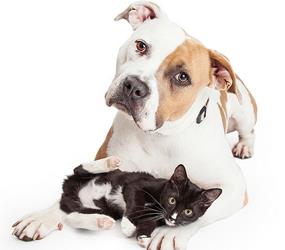Pet Sinusitis: Causes, Symptoms and Treatment

When a veterinarian sees a pet for reasons related to ongoing problems of sneezing and nasal discharge, there is a good chance that the animal will be diagnosed with sinusitis. Affecting cats and dogs much the same way they do people, sinus infections can make a pet feel miserable when not properly treated.
Sinusitis in Pets
Observing nasal discharge and sneezing is not uncommon in cats and dogs. In a normal nose, mucus works along with cilia to rid the sinuses of bacteria and environmental particles, and sneezing forces these particles out. However, when the sinus passages in the nasal cavity become inflamed and mucus cannot drain out of the body, a sinus infection may occur.
Causes of Sinusitis in Dogs and Cats
Sinus infections can affect all ages of dogs and cats, but younger animals seem to be more susceptible. Infections have been attributed to the following causes:
- Allergens or environmental irritants
- Asthma
- Weakened immune system
- Autoimmune disease
- Bacterial
- Fungal
- Parasites
- Viral
- Dental disease
- Oronasal fistula
- Polyp
- Cancer
- Trauma to the face
- Foreign body lodged in sinuses or nasal cavity.
Symptoms of Pet Sinusitis
The following symptoms may be observed in cats and/or dogs diagnosed with a sinus infection:
- Sneezing
- Coughing
- Nasal discharge
- Nasal bleeding
- Difficulty breathing
- Watery eyes or purulent eye discharge
- Gagging due to the nasal discharge
- Pain caused by pressure in the forehead and around the eyes
- Behavioral indications such as:
- Animal sits with a hanging head and eyes partially closed
- Animal seen pawing at its nose
- Facial deformity, such as swelling below the eye
- Fever
- Halitosis
- Loss of appetite
- Rapid weight loss
- Dehydration.
Diagnosis Checklist for Sinusitis in Pets
When being examined, the presence of these clinical signs will point to a sinus infection. However, since there are many possible contributing causes, in order to appropriately treat the animal it is important to pin down the specific reason for the infection.
To determine the underlying cause, the type of information required will vary depending upon the animal. The initial basic tests will include:
- Urinalysis
- Biochemical profile
- Complete blood count.
Diagnostic confirmation, however, may require additional data obtained through procedures such as:
- X-rays of the following areas:
- Chest
- Nasal
- Dental
- Skull
- Cytology
- Allergen testing
- Computed tomography (CT) scan or a magnetic resonance imaging (MRI)
- Bacterial culture of nasal discharge
- Feline leukemia virus test
- Heartworm test
- Rhinoscopy
- Biopsy.
Treatment of Pet Sinusitis
Once the underlying cause is determined, veterinary treatment for the inflammation will be animal specific and could include:
- Antibiotics, such as:
- Cephalexin
- Amoxicillin
- Ciprofloxacin
- Antifungal therapy
- Parasiticides
- Anti-inflammation therapy
- Flushing the sinuses
- Chemotherapy
- Surgery.
8 Tips for Clients Who Have Pets with Sinusitis
Before they leave the clinic, remind clients of the following tips for providing home care to a pet diagnosed with sinusitis:
- Drainage of the nasal passages will be aided by increasing the air moisture and humidity
- Run a humidifier
- Place a vaporizer within the animal’s living quarters
- Keep the pet’s nose clean
- Use a warm, soft cloth to remove any mucus or dried mucus from the nose
- Wipe a small amount of petroleum jelly on the surface of the nose, being careful not to block the nostrils
- Provide a nutritious, high-quality food
- If pet shows loss of appetite, encourage it to eat by offering a substitute; for example, a food with a different or stronger smell, such as one made with fish
- Encourage pet to drink by providing a constant supply of clean water
- Any increased water intake will help to prevent further congestion and will promote mucus drainage
- Wash both food and water bowls often and thoroughly with soap and hot water
- Keep animals that are sick away from healthy animals
- Provide pet with a warm, comfortable, and quiet area to convalesce
- When medicine is prescribed, administer on time and for the appropriate length of time, according to the veterinarian’s instructions.
Early Treatment of Sinusitis Is Critical
While many cats and dogs respond positively to a prescribed treatment of medication, some may continue to have ongoing sinus problems. Veterinary therapies are most successful when treatment begins in the early stages of disease. Encourage your clients to bring in their pets when symptoms first arise.
If interested in further information regarding companion pet treatment, please contact your Covetrus representative at: 855.724.3461.
Careers
Are you looking for a place to let your talents shine? At Covetrus, we help our practitioner customers better serve their patients and take pride in providing the best customer experience possible. Search our open positions to see our available opportunities.
Newsletter
Stay current with what’s going on with Covetrus, subscribe to receive our newsletter and email communications. Subscribers will receive the latest information in practice management, sales and marketing, animal health, and more.


Leave a comment